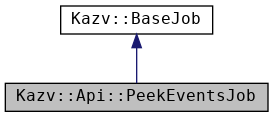Kazv::Api::PeekEventsJob Class Reference
Listen on the event stream of a particular room. More...
#include <peeking_events.hpp>
Inheritance diagram for Kazv::Api::PeekEventsJob:

Collaboration diagram for Kazv::Api::PeekEventsJob:

Classes | |
| class | JobResponse |
Public Member Functions | |
| PeekEventsJob (std::string serverUrl, std::string _accessToken, std::optional< std::string > from=std::nullopt, std::optional< int > timeout=std::nullopt, std::optional< std::string > roomId=std::nullopt) | |
| Listen on the event stream of a particular room. More... | |
| PeekEventsJob | withData (JsonWrap j) && |
| PeekEventsJob | withData (JsonWrap j) const & |
 Public Member Functions inherited from Kazv::BaseJob Public Member Functions inherited from Kazv::BaseJob | |
| BaseJob (std::string serverUrl, std::string requestUrl, Method method, std::string jobId, std::string token={}, ReturnType returnType=ReturnType::Json, Body body=EmptyBody{}, Query query={}, Header header={}, std::optional< FileDesc > responseFile=std::nullopt) | |
| ~BaseJob () | |
| bool | shouldReturnJson () const |
| std::string | url () const |
| Body | requestBody () const |
| Header | requestHeader () const |
| ReturnType | returnType () const |
| Query | requestQuery () const |
| returns the non-encoded query as an array of pairs More... | |
| Method | requestMethod () const |
| Response | genResponse (Response r) const |
| BaseJob | withData (JsonWrap j) && |
| BaseJob | withData (JsonWrap j) const & |
| BaseJob | withQueue (std::string id, JobQueuePolicy policy=AlwaysContinue) && |
| BaseJob | withQueue (std::string id, JobQueuePolicy policy=AlwaysContinue) const & |
| json | dataJson (const std::string &key) const |
| std::string | dataStr (const std::string &key) const |
| std::string | jobId () const |
| std::optional< std::string > | queueId () const |
| JobQueuePolicy | queuePolicy () const |
| std::optional< FileDesc > | responseFile () const |
Static Public Member Functions | |
| static constexpr auto | needsAuth () |
| static BaseJob::Query | buildQuery (std::optional< std::string > from, std::optional< int > timeout, std::optional< std::string > roomId) |
| static BaseJob::Body | buildBody (std::optional< std::string > from, std::optional< int > timeout, std::optional< std::string > roomId) |
 Static Public Member Functions inherited from Kazv::BaseJob Static Public Member Functions inherited from Kazv::BaseJob | |
| static bool | contentTypeMatches (immer::array< std::string > expected, std::string actual) |
Additional Inherited Members | |
 Public Types inherited from Kazv::BaseJob Public Types inherited from Kazv::BaseJob | |
| enum | ReturnType { Json , File } |
| using | Method = std::variant< Get, Post, Put, Delete > |
| using | Body = ::Kazv::Body |
| using | BytesBody = ::Kazv::BytesBody |
| using | JsonBody = ::Kazv::JsonBody |
| using | EmptyBody = ::Kazv::EmptyBody |
| using | Header = ::Kazv::Header |
| using | Response = ::Kazv::Response |
 Static Public Attributes inherited from Kazv::BaseJob Static Public Attributes inherited from Kazv::BaseJob | |
| static Get | GET {} |
| static Post | POST {} |
| static Put | PUT {} |
| static Delete | DELETE {} |
 Protected Member Functions inherited from Kazv::BaseJob Protected Member Functions inherited from Kazv::BaseJob | |
| void | attachData (JsonWrap data) |
Detailed Description
Listen on the event stream of a particular room.
This will listen for new events related to a particular room and return them to the caller. This will block until an event is received, or until the timeout is reached.
This API is the same as the normal /events endpoint, but can be called by users who have not joined the room.
Note that the normal /events endpoint has been deprecated. This API will also be deprecated at some point, but its replacement is not yet known.
Constructor & Destructor Documentation
◆ PeekEventsJob()
|
explicit |
Listen on the event stream of a particular room.
- Parameters
-
from The token to stream from. This token is either from a previous request to this API or from the initial sync API. timeout The maximum time in milliseconds to wait for an event. roomId The room ID for which events should be returned.
Member Function Documentation
◆ buildBody()
|
static |
◆ buildQuery()
|
static |
◆ needsAuth()
|
inlinestaticconstexpr |
◆ withData() [1/2]
| PeekEventsJob Kazv::Api::PeekEventsJob::withData | ( | JsonWrap | j | ) | && |
◆ withData() [2/2]
| PeekEventsJob Kazv::Api::PeekEventsJob::withData | ( | JsonWrap | j | ) | const & |
The documentation for this class was generated from the following files:
- src/api/csapi/peeking_events.hpp
- src/api/csapi/peeking_events.cpp